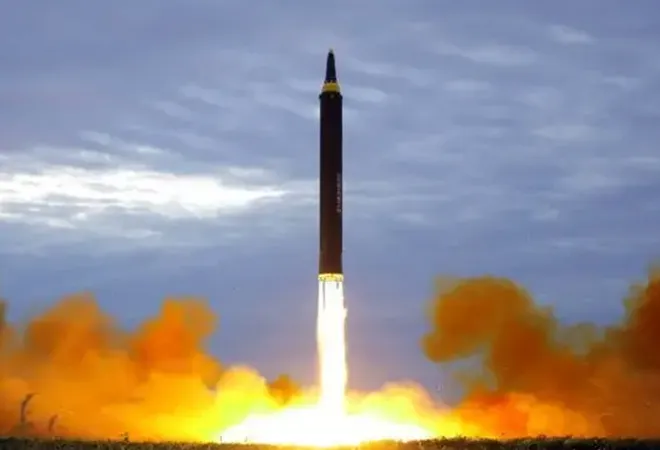-
CENTRES
Progammes & Centres
Location
International condemnation, sanctions, and diplomatic efforts have not yielded results as Pyongyang continues to expand its nuclear capabilities

According to a recent report submitted to the United Nation (UN) Security Council Sanctions Committee, North Korea has continued to build on its nuclear and ballistic capabilities as well as the capacity to produce nuclear fissile materials. The report, submitted on 4 February by an independent sanctions monitor, details North Korea’s demonstrations of missile testing and deployment capabilities. The UN Security Council has long banned North Korea from conducting nuclear tests and has also placed Pyongyang under a number of sanctions as a result of the country’s nuclear and missile activities. The report states that “although no nuclear tests or launches of Intercontinental Ballistic Missiles (ICBMs) were reported, Democratic People's Republic of Korea (DPRK) continued to develop its capability for production of nuclear fissile materials.” The report comes a few weeks after North Korea’s assertion that it will resume its “temporally suspended activities” as a defence against the United States. This is potentially in reference to the 2017 self-imposed moratorium on nuclear weapons testing. As North Korea ramps up its missile tests and reasserts its decision to meet its nuclear weapons milestones, the concerns around increased hostility and accelerated weapons testing are not unfounded.
Neighbouring countries such as Japan and South Korea have long raised concerns about Pyongyang’s tests as a threat to regional security and stability.
The report raises a number of concerns around North Korea’s recent efforts in the nuclear domain. According to the report, North Korea has tested new technologies which include a “a possible hypersonic guiding warhead and a maneuverable re-entry vehicle.” The report also raises concerns around North Korea’s “increased capabilities for rapid deployment, wide mobility (including at sea), and improved resilience of its missile forces.” In the month of January, Pyongyang carried out nine ballistic missile launches, making it the largest number of tests in the country’s history of nuclear weapons and missile programmes. One of the most recent tests involved a Hwasong-12 mid-range ballistic missile which can reportedly carry a large-size nuclear warhead. Neighbouring countries such as Japan and South Korea have long raised concerns about Pyongyang’s tests as a threat to regional security and stability. These concerns are backed by statements from key actors in the international nuclear domain as these tests and North Korea’s nuclear ambitions pose a serious threat to international security and may cause nuclear escalations with states such as the US. The US expressed concerns about North Korea’s growing nuclear programme, specifically in relation to the tests conducted in January. Denuclearisation talks between Washington and Pyongyang have also been stalled since the breakdown in talks at the 2019 summit between North Korean leader Kim Jong-un and then-US President Donald Trump. The January 2022 tests add to the dangers of a nuclear-advanced North Korea.
The cyber attacks targeted crypto exchanges in Asia, North America, and Europe between 2020 and mid-2021 and add to the estimated US $2 billion netted through cyber attacks in 2019.
The UN report also looks at how North Korea’s missile programme is funded. According to the sanctions monitor, the country’s missile programme has been funded through cryptocurrency (worth more than US $50 million) stolen through cyber attacks and has been a key source of revenue. North Korea has acquired around US $400 million through cyber attacks in 2021. As per the report, the cyber attacks targeted crypto exchanges in Asia, North America, and Europe between 2020 and mid-2021 and add to the estimated US $2 billion netted through cyber attacks in 2019. Despite UN sanctions, Pyongyang has been able to further grow its nuclear infrastructure and continues to do so through technological advancements and intense scientific research. As a result of illicit cyber and trade activities, North Korea has been able to significantly expand its nuclear and missile programme.
The UN report comes at a time when concerns around North Korea’s nuclear ambitions are at a high. North Korea’s withdrawal from the Nuclear Non-Proliferation Treaty in 2003 was a major blow to global nuclear disarmament. The country’s ability to advance its nuclear weapons programme despite the subsequent crippling international sanctions has significantly added to the instability in the region and beyond. North Korea’s accelerated weapons programme and possible move to lift its moratorium on nuclear weapons testing and ICBMs launches threaten the prospects of any denuclearisation talks.
North Korea’s withdrawal from the Nuclear Non-Proliferation Treaty in 2003 was a major blow to global nuclear disarmament.
The nuclear world order has witnessed setbacks in recent years from several key nuclear actors, including and specifically North Korea. As the sanctions monitor reiterates, North Korea’s ability to evade sanctions and bans to continue its malicious activities in the nuclear domain debilitates the very foundations of treaties such as the NPT. It is extremely unlikely for North Korea to give up its nuclear weapons, given these recent developments and the general stance in Pyongyang on its nuclear weapons advancement. However, it is crucial for key international actors to attempt and limit Pyongyang’s testing ambitions. For North Korea, its nuclear weapons serve as leverage to counter its growing domestic challenges (for example, food shortage) at the international negotiating table. It is evident that present international regulations and restrictions have had a deeper impact on civilians in the country rather than curbing the country’s military expansion and advancements. Therefore, as highlighted by the UN report, there must be a change in approach in order to shrink the growing risks and concerns as a result of Pyongyang’s nuclear goals.
The views expressed above belong to the author(s). ORF research and analyses now available on Telegram! Click here to access our curated content — blogs, longforms and interviews.

Pulkit Mohan is the Head of Forums at ORF. She is responsible for the ideation curation and execution of ORFs flagship conferences. Her research focuses include ...
Read More +